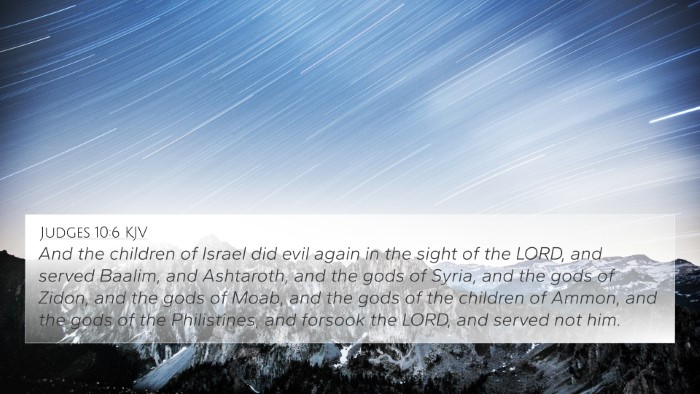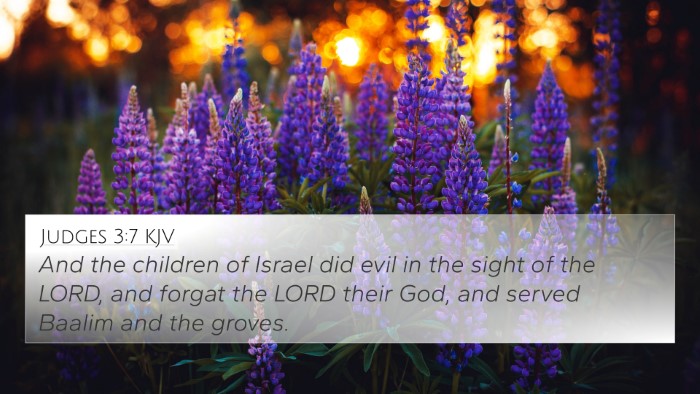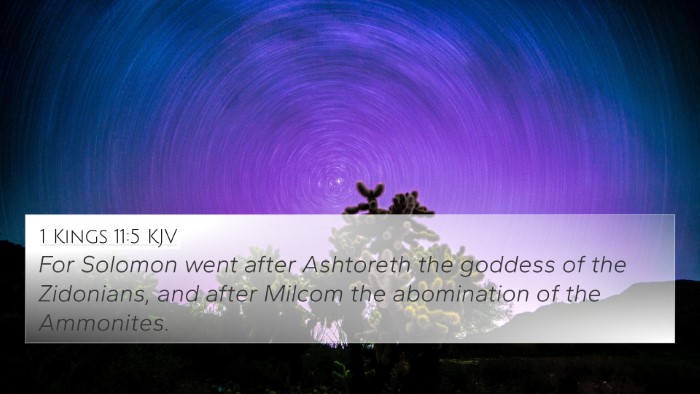Old Testament
Genesis Exodus Leviticus Numbers Deuteronomy Joshua Judges Ruth 1 Samuel 2 Samuel 1 Kings 2 Kings 1 Chronicles 2 Chronicles Ezra Nehemiah Esther Job Psalms Proverbs Ecclesiastes Song of Solomon Isaiah Jeremiah Lamentations Ezekiel Daniel Hosea Joel Amos Obadiah Jonah Micah Nahum Habakkuk Zephaniah Haggai Zechariah MalachiJudges 2:13 Similar Verses
Judges 2:13 Cross References
And they forsook the LORD, and served Baal and Ashtaroth.
Uncover the Rich Themes and Topics of This Bible Verse
Listed below are the Bible themes associated with Judges 2:13. We invite you to explore each theme to gain deeper insights into the Scriptures.
Judges 2:13 Cross Reference Verses
This section features a detailed cross-reference designed to enrich your understanding of the Scriptures. Below, you will find carefully selected verses that echo the themes and teachings related to Judges 2:13 KJV. Click on any image to explore detailed analyses of related Bible verses and uncover deeper theological insights.

Judges 10:6 (KJV) »
And the children of Israel did evil again in the sight of the LORD, and served Baalim, and Ashtaroth, and the gods of Syria, and the gods of Zidon, and the gods of Moab, and the gods of the children of Ammon, and the gods of the Philistines, and forsook the LORD, and served not him.

Judges 3:7 (KJV) »
And the children of Israel did evil in the sight of the LORD, and forgat the LORD their God, and served Baalim and the groves.

Judges 2:11 (KJV) »
And the children of Israel did evil in the sight of the LORD, and served Baalim:

1 Corinthians 10:20 (KJV) »
But I say, that the things which the Gentiles sacrifice, they sacrifice to devils, and not to God: and I would not that ye should have fellowship with devils.

2 Kings 23:13 (KJV) »
And the high places that were before Jerusalem, which were on the right hand of the mount of corruption, which Solomon the king of Israel had builded for Ashtoreth the abomination of the Zidonians, and for Chemosh the abomination of the Moabites, and for Milcom the abomination of the children of Ammon, did the king defile.

1 Kings 11:5 (KJV) »
For Solomon went after Ashtoreth the goddess of the Zidonians, and after Milcom the abomination of the Ammonites.

1 Kings 11:33 (KJV) »
Because that they have forsaken me, and have worshipped Ashtoreth the goddess of the Zidonians, Chemosh the god of the Moabites, and Milcom the god of the children of Ammon, and have not walked in my ways, to do that which is right in mine eyes, and to keep my statutes and my judgments, as did David his father.

1 Samuel 31:10 (KJV) »
And they put his armor in the house of Ashtaroth: and they fastened his body to the wall of Bethshan.

1 Corinthians 8:5 (KJV) »
For though there be that are called gods, whether in heaven or in earth, (as there be gods many, and lords many,)
Judges 2:13 Verse Analysis and Similar Verses
Bible Verse Meaning: Judges 2:13
Judges 2:13: "And they forsook the LORD, and served Baal and Ashtaroth."
Summary of the Verse
This verse captures a significant spiritual decline among the Israelites. After the death of leaders like Joshua, the Israelites turned away from worshiping Yahweh, gravitating towards the Canaanite gods Baal and Ashtaroth. This departure from their covenant with God highlights the recurring theme of unfaithfulness in the book of Judges.
Combined Insights from Public Domain Commentaries
Matthew Henry: Henry emphasizes that this forsaking of the Lord was a betrayal of their covenant. The Israelites, after living in the blessings and protection of God, chose to exchange their divine heritage for the worship of false deities. His commentary notes the gravity of their actions, suggesting that such decisions have severe spiritual consequences.
Albert Barnes: Barnes discusses the implications of serving Baal and Ashtaroth. He points out that Baal represented fertility and was often associated with agricultural prosperity, whereas Ashtaroth represented love and war. This reflects not only the Israelites' infidelity but also their desire to conform to the surrounding pagan cultures that promised immediate benefits over faithfulness to God.
Adam Clarke: Clarke notes the historical context of the Canaanite worship practices, which were seductive due to their sensuality and cultural acceptance. He argues that this passage illustrates the importance of remaining rooted in one's faith against societal pressures that lure one to idolatry. The underlying message revolves around the dangers of spiritual compromise.
Thematic Connections
The verse highlights several themes prevalent throughout the Bible:
- Idolatry: The chronic problem of turning away from God to serve false idols is a consistent theme seen in the history of Israel.
- Faithfulness vs. Unfaithfulness: This contrasts the relationship between God and His people, which is often marred by disobedience.
- Consequences of Sin: The departure from God leads to a cycle of oppression and suffering in the Judges narrative.
Cross-References Related to Judges 2:13
Here are some Bible verses that provide cross-references and connections to Judges 2:13:
- Exodus 20:3-5: The commandment against having other gods.
- Joshua 24:15: Joshua’s challenge to the Israelites to choose whom they will serve.
- 1 Samuel 8:8: Refers to Israel's rejection of God as their king.
- Romans 1:25: Paul speaks about exchanging the truth of God for a lie.
- Hosea 4:12: God’s charge against Israel for seeking guidance from wooden idols.
- Jeremiah 2:13: God laments how His people have forsaken Him, the fountain of living waters.
- 1 Kings 18:21: Elijah questions the people about serving God or Baal.
- 2 Kings 17:16: Details on how Israel went after other gods, including Baal.
- Matthew 6:24: Jesus' teaching that one cannot serve two masters.
- Galatians 5:7-8: Paul encourages the Galatians not to turn away from the truth they received.
Applying Cross-Referencing Techniques
Understanding the connections between Bible verses enriches our interpretation of Scripture. The act of cross-referencing Biblical texts aids in identifying themes and principles that apply universally. In studying Judges 2:13, it is helpful to consider:
- Identifying connections between Old and New Testament teachings.
- How Israel's struggles with idolatry relate to the Christian call for holiness and separation from the world.
- How the faithfulness of God contrasts starkly with the unfaithfulness of His people.
Resources such as a Bible concordance or a cross-reference Bible study guide can assist individuals in this scholarly endeavor.
Conclusion
Judges 2:13 serves as a profound reminder of the danger of forsaking God for temporary gains promised by false idols. The insights from Matthew Henry, Albert Barnes, and Adam Clarke, in conjunction with relevant cross-references, provide a deeper understanding of this pivotal moment in Israel's history. Systematic cross-referencing and thematic analysis using these commentaries and scriptures enhances the comprehension of the biblical text, guiding us in how to remain faithful in our own spiritual journeys.



